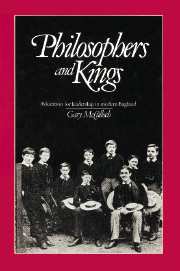7 - Tribune
Published online by Cambridge University Press: 16 November 2009
Summary
Norwood, James and many other twentieth-century adherents of ‘education for leadership’ saw the Labour Party as a natural enemy of the values and priorities that they cherished. Such hostility tended to be mutual, as Labour's educational policy generally advocated greater equality and the abolition of structures that resisted or restricted this growth. Public schools were subjected to trenchant criticisms, as were the grammar schools after 1945. Less noticed, and certainly less successful, than the dominant Labour emphasis upon equality has been a tendency in socialist thought that has sought effective leadership of the working class based on new kinds of training and education. This latter kind of approach attempted to develop in various ways the ‘popular leaders’ envisaged by J.A. Hobson.
THE LABOUR TRADITION OF EQUALITY
Throughout the present century, the Labour Party and the organised labour movement in general have usually insisted upon ‘equality’ and ‘democracy’ in education. Key figures in this regard were the historian R.H. Tawney, especially in the interwar period, and Anthony Crosland in the 1950s and 1960s. In his major work Equality, published in 1931, Tawney fiercely denounced what he called the ‘religion of inequality’. He was especially critical of the character and effects of education in England. The public schools, he noted, were ‘traditionally connected with the middle and upper classes’: ‘Drawing their pupils mainly, not from the public primary schools, but from the so-called preparatory schools, and catering for the requirements of the wealthier sections of the community, they form virtually a closed educational system of their own, side by side with the system of public education which has as its foundation the elementary school.’
- Type
- Chapter
- Information
- Philosophers and KingsEducation for Leadership in Modern England, pp. 98 - 118Publisher: Cambridge University PressPrint publication year: 1991



